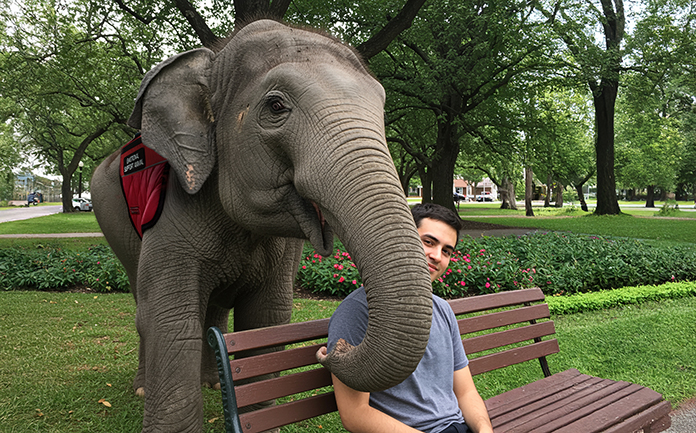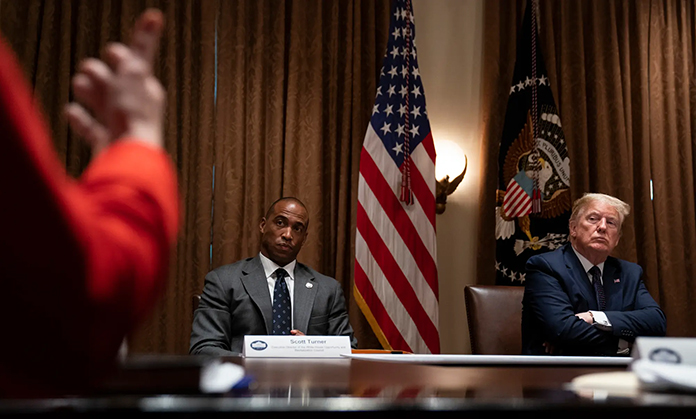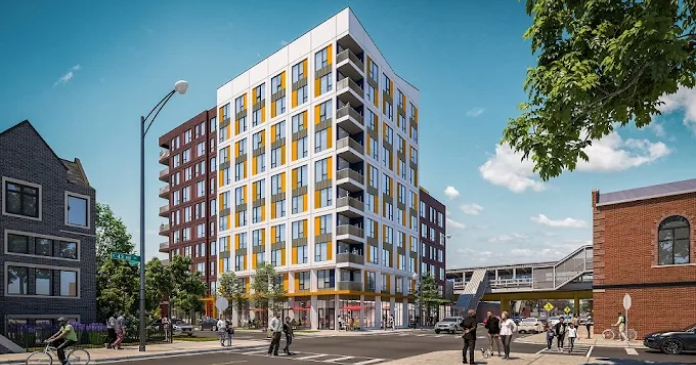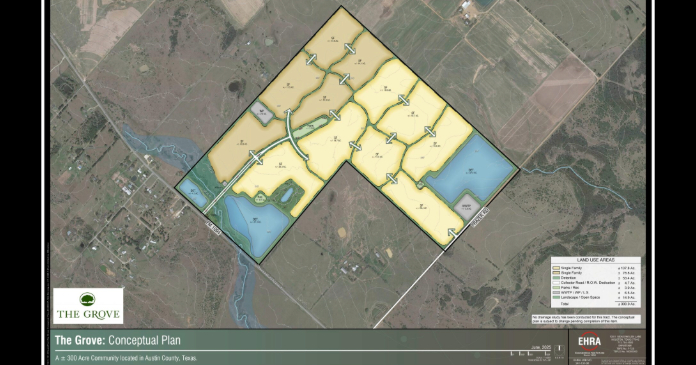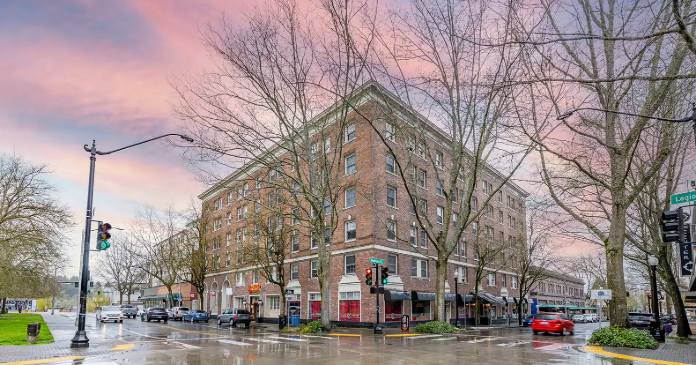When he went to Barcelona in 1992 to play on the original “Dream Team,” he returned with a gold medal.
After retiring from the NBA, he formed a development company to build a shopping plaza. He subsequently partnered with Sony Entertainment to operate theaters in under-served communities and later joined up with Starbucks to open coffee shops in urban areas. Today, his portfolio includes five theaters, cafes in 38 cities and a couple of restaurants.
Now he’s setting his sights on multifamily housing, hoping to make his mark by building condominiums that are affordable to members of the workforce — teachers, police officers and firefighters — who so often cannot afford to live in the communities they serve.
His name is Earvin Johnson Jr. But you may know him better as Magic. Which is what he brings to everything he does as well as to the people whose lives he touches.
Humble beginnings
Earvin Johnson Jr. was born on August 14, 1959. He grew up in Lansing, Mich., his dad a worker in a General Motors plant and his mom, a school custodian.
As a child, Johnson dreamed of being a businessman. Sure, he spent lots of time playing ball — often arriving on the court by 7:30 in the morning — but with nine brothers and sisters, he developed a strong work ethic early on.
“When you come from a family of 10 kids, any extra money you want you have to earn yourself — through a paper route or shoveling snow,” said Johnson. “Shoveling was my job, and I got five or 10 dollars for each house.”
It was around that time that his passion to give back to the community was born. “That passion really came from my mother,” Johnson said, who required him to shovel the homes of several elderly neighbors for free.
“I told her that was $40 or $50,” he recalled. “But she said I had to do those for free every time it snowed because it was the right thing to do. I couldn’t understand why until later on.” Johnson’s mother — a devout Christian — also encouraged the family to assist neighbors who were moving and brought the entire family to visit people who fell ill. “I grew up like that, and I still have that same passion to give back,” he said.
Magic tricks
Johnson earned his nickname due to his on-court achievements at Everett High School. It was actually a sports writer who gave him the moniker after watching Johnson score 36 points, 16 rebounds and 16 assists in one night. With his extraordinary skills, Johnson led his team senior year to a 27-1 record — and the state title — all while averaging 28.8 points and 16.8 rebounds.
With little else to accomplish at the college level, Johnson entered the NBA draft in 1979. He was drafted by the Los Angeles Lakers as the first overall pick — and he remained there for the next 13 years.
During his 13-year tenure at the Lakers, Johnson was a superstar, leading the team to five championship titles. He was named the NBA Finals MVP three times and was a 12-time NBA All-Star.
Then, in November 1991, he shocked the world by announcing that he was HIV positive and was retiring. Stints as an author, television commentator and coach followed. But the itch to be a businessman remained.
“Business has always been my passion and my dream,” Johnson said. “I wanted to become successful not only for myself but for my sons–and to show people that athletes could go from the court to the boardroom.”
A new direction
Johnson set out to learn everything he could about the business world. He read scores of books and sought advice from people such as Michael Ovitz. “He told me to stop reading the sports section and to read the business section and financial magazines,” Johnson said. “He also taught me that the same discipline I had as a basketball player I had to apply to become a businessman.”
Johnson learned his lessons well. In 1992, he launched Johnson Development Corp., a Beverly Hills, Calif.-based firm whose mission is to “be the nation’s foremost development company through enrichment of under-served markets across the country.”
The firm achieves its mission by partnering with other businesses. It currently has a presence in 65 cities and 16 states by virtue of its relationships with Loews Cineplex Entertainment, Starbucks, T.G.I. Friday’s and Washington Mutual.
Johnson Development’s first real estate project was a shopping plaza in West Las Vegas, along with partner Raul Walter Properties. The project was the first development in 30 years in that area, predominantly an African-American community.
Johnson strives to create jobs in the communities in which he builds. He also employs minority contractors and vendors.In 1998, Johnson Development teamed up with Canyon Capital Realty Advisors to form the Canyon-Johnson Urban Fund (CJUF), a closed-end real estate fund that focuses on acquiring, developing, redeveloping and repositioning real estate in urban areas. The two firms raised close to $300 million to launch CJUF I. In 2005, they closed an additional $600 million to form CJUF II. With nearly $1 billion in committed equity capital, the two funds are positioned to facilitate more than $4 billion in development and urban revitalization.
The combining of Johnson Development with Canyon Capital was more than the marriage of two companies; it also brought together Magic Johnson with K. Robert Turner, now managing partner of CJUF, but also a close friend and advisor to Johnson. “Earvin’s organization had an unparalleled knowledge of the urban communities–not just with regard to real estate, but also in understanding the nuances and uniqueness of the urban consumer,” said Turner. “By pooling Earvin’s sensitivity with our expertise in real estate, it was a win/win situation for everybody.”
CJUF started by investing $140 million in eight projects: Midtown Center in Milwaukee, Wis.; Severance Town Center in Cleveland, Ohio; Sunset & Vine in Hollywood, Calif.; Sunset & St. Andrews in Hollywood, Calif.; Park Place Condominiums in Brooklyn, N.Y.; Transamerica in Los Angeles; State Place in Chicago; and Downtown Dadeland in Miami.
In October, CJUF announced its first investment in Miami’s Little Havana neighborhood through a partnership with local developer mFm Construction Corp. The mixed-use development, called Morrison, will bring much needed for-sale workforce housing and the first new retail space in 20 years to Little Havana, a 25-block neighborhood located just five blocks from Miami’s financial district. It will include two 19-story residential towers, over 30,000 square feet of retail space and 34,000 square feet of office space. The 395 condominiums are priced from $240,000 to $400,000.
“There is a direct need for affordable workforce housing in Little Havana, and the Canyon Johnson/mFm team is delivering it on a scale we didn’t think possible,” said Manny Diaz, the Mayor of Miami.
Unlike other celebrities who merely license their name to real estate projects or other business opportunities, Johnson is involved in all aspects of his projects. “He wants to know what the projects involve and the personalities that are involved,” said Steve Baile, vice president of the Atlanta operations of Birmingham, Ala.-based Daniel Corp., which is partnering with CJUF and Selig Enterprises Inc. to build 1010 Midtown, a 35-story, 630,000-square-foot, mixed-use development in Atlanta. “He’s a really good promoter of the projects — you wouldn’t believe how many people called out of the blue and said they had met Magic Johnson and he told them to call to talk about the project. Plus, he’s an incredibly vibrant and exciting individual — when he gets in the room, it just lights up.”
CJUF is always looking for new opportunities, Turner said. Any potential project needs to have what Turner calls the “five Ds”: density of population, existing demand, diversity of population, a reputable developer with a similar commitment to urban revitalization, and “d”leadership,– which Turner said is a strong mayor and local government committed to pro-business, pro-urban revitalization.
All CJUF projects also need to have a double bottom line. “We are absolutely there to make money — that’s our fiduciary duty to our investors,” Turner said. “But Earvin and I also believe we have a social responsibility to the communities in which we invest to make sure our investments provide opportunities for the residents.”
Turner said that CJUF I was responsible for creating over 5,000 permanent jobs and 4,000 units of workforce housing. His goal is to generate 20 percent returns for his investors. “Most developers look for 30 and 40 percent returns,” he said. “That’s not the business we’re in. We think that if we can generate 20 percent returns and at the same time create jobs and taxes and provide affordable housing, we’re successful.”
Leading the way
Magic Johnson was one of the first athletes to segue from the basketball court to real estate development, but more are following in his footsteps every day. Miami Heat center Shaquille O’Neal, another force on the court, recently formed The O’Neal Group, a Miami- based real estate company that plans to develop properties throughout the nation. The company’s first project is a partnership with MDM Development Group, the developer of the $1 billion Metropolitan Miami, comprised of three residential towers with 1,100 condominiums, a luxury hotel, retail, office and entertainment space.
“Real estate in recent years has been among the best performing assets,” said Katrina Campins, a contestant on the first season of “The Apprentice,” and founder of The Campins Co., a real estate brokerage in Miami Beach. “At the same time, high-profile real estate developers such as Donald Trump have made the industry sexy as they have raised their celebrity status and respect, making fistfuls of money along the way. The ultimate symbol of success for today’s athlete is to be respected on the playing field and in the boardroom.”
Campins has received so many inquiries from sports personalities wanting to invest in real estate that she recently formed a new Sports and Entertainment Division. In 2006, the firm completed 42 real estate deals while representing athletes and/or entertainers in South Florida and around the country, and Campins said she’s currently working with several high-profile athletes to associate them with new real estate projects in which they lend marketing services to the project in exchange for equity or discounted units.
But Magic Johnson does more than just market his projects, and that impresses Campins, as does his dedication to helping the community. “What Magic Johnson has done is wonderful,” she said. “He has focused on affordable housing and inner-city projects, which are sorely needed, and is making money at the same time. As a result of success stories like this, athletes realize they can make even more money and have a greater impact on society if they use their career as an athlete as a stepping stone to their future business endeavors.”
The way ahead
Beyond Johnson’s work with Johnson Development, he also heads Magic Johnson Entertainment, Magic Johnson Productions and Magic Johnson Music. He leads the Magic Johnson Foundation, a non-profit organization dedicated to improving the health, educational and social needs of inner city youth. Johnson has also found time to serve as a United Nations Messenger of Peace, to talk to youth about drugs and violence and to help raise over $1.5 million for the Muscular Dystrophy Association. His scholarship program has enabled 3,000 students to attend college. And he has also worked with the Make a Wish Foundation, United Negro College Fund, Starlight Foundation, American Heart Association and Urban League.
All while HIV positive.
Johnson said his health today is “amazing.” He wakes up every day at 5:30 a.m., does 90 minutes of cardio and then light weights. Then he goes to the office.
“I always tell him to do the light lifting in the gym because he’s got to do the heavy lifting in the office,” said Turner.
And now Johnson is encouraging his children to follow in his footsteps. His son, Andre, 25, works with his dad and Turner on CJUF. He also brings in new deals and business opportunities for the enterprise side of his dad’s business. “Andre works harder than any other kid I’ve ever met,” said Turner. “He’s passionate, he loves it, and I think he looks at this as an opportunity to prove to his father that he is the son of a great man.”
In 2003, Johnson was quoted in a magazine article as saying he planned to work for another five or six years and then put his businesses on autopilot. But he’s having too much fun to retire. “Let’s say about 10 more years,” he said.
“I love waking up every day — working out, going into the office and then seeing our projects come together with a local developer,” Johnson said. “It’s a tremendous feeling to see people excited about a new development they can afford. That’s what gets me going — the fact that we’re giving people the opportunity to live, work and play in their own community.”
It no doubt makes his mom proud as well.
Author: Robyn A. Friedman




